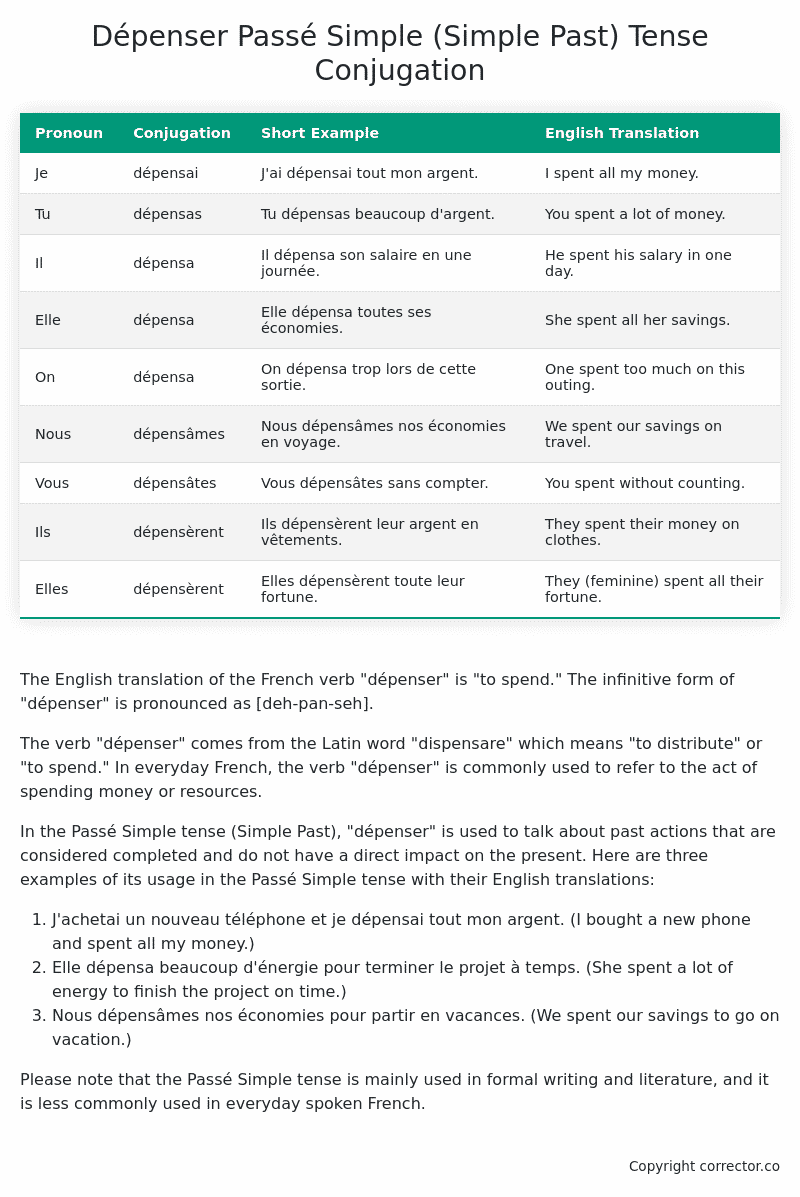Passé Simple (Simple Past) Tense Conjugation of the French Verb dépenser
Introduction to the verb dépenser
The English translation of the French verb “dépenser” is “to spend.” The infinitive form of “dépenser” is pronounced as [deh-pan-seh].
The verb “dépenser” comes from the Latin word “dispensare” which means “to distribute” or “to spend.” In everyday French, the verb “dépenser” is commonly used to refer to the act of spending money or resources.
In the Passé Simple tense (Simple Past), “dépenser” is used to talk about past actions that are considered completed and do not have a direct impact on the present. Here are three examples of its usage in the Passé Simple tense with their English translations:
- J’achetai un nouveau téléphone et je dépensai tout mon argent. (I bought a new phone and spent all my money.)
- Elle dépensa beaucoup d’énergie pour terminer le projet à temps. (She spent a lot of energy to finish the project on time.)
- Nous dépensâmes nos économies pour partir en vacances. (We spent our savings to go on vacation.)
Please note that the Passé Simple tense is mainly used in formal writing and literature, and it is less commonly used in everyday spoken French.
Table of the Passé Simple (Simple Past) Tense Conjugation of dépenser
| Pronoun | Conjugation | Short Example | English Translation |
|---|---|---|---|
| Je | dépensai | J’ai dépensai tout mon argent. | I spent all my money. |
| Tu | dépensas | Tu dépensas beaucoup d’argent. | You spent a lot of money. |
| Il | dépensa | Il dépensa son salaire en une journée. | He spent his salary in one day. |
| Elle | dépensa | Elle dépensa toutes ses économies. | She spent all her savings. |
| On | dépensa | On dépensa trop lors de cette sortie. | One spent too much on this outing. |
| Nous | dépensâmes | Nous dépensâmes nos économies en voyage. | We spent our savings on travel. |
| Vous | dépensâtes | Vous dépensâtes sans compter. | You spent without counting. |
| Ils | dépensèrent | Ils dépensèrent leur argent en vêtements. | They spent their money on clothes. |
| Elles | dépensèrent | Elles dépensèrent toute leur fortune. | They (feminine) spent all their fortune. |
Other Conjugations for Dépenser.
Le Present (Present Tense) Conjugation of the French Verb dépenser
Imparfait (Imperfect) Tense Conjugation of the French Verb dépenser
Passé Simple (Simple Past) Tense Conjugation of the French Verb dépenser (You’re reading it right now!)
Passé Composé (Present Perfect) Tense Conjugation of the French Verb dépenser
Futur Simple (Simple Future) Tense Conjugation of the French Verb dépenser
Futur Proche (Near Future) Tense Conjugation of the French Verb dépenser
Plus-que-parfait (Pluperfect) Tense Conjugation of the French Verb dépenser
Passé Antérieur (Past Anterior) Tense Conjugation of the French Verb dépenser
Futur Antérieur (Future Anterior) Tense Conjugation of the French Verb dépenser
Subjonctif Présent (Subjunctive Present) Tense Conjugation of the French Verb dépenser
Subjonctif Passé (Subjunctive Past) Tense Conjugation of the French Verb dépenser
Subjonctif Imparfait (Subjunctive Imperfect) Tense Conjugation of the French Verb dépenser
Subjonctif Plus-que-parfait (Subjunctive Pluperfect) Tense Conjugation of the French Verb dépenser
Conditionnel Présent (Conditional Present) Tense Conjugation of the French Verb dépenser
Conditionnel Passé (Conditional Past) Tense Conjugation of the French Verb dépenser
Conditionnel Passé II (Conditional Past II) Tense Conjugation of the French Verb dépenser
L’impératif Présent (Imperative Present) Tense Conjugation of the French Verb dépenser
L’impératif Passé (Imperative Past) Tense Conjugation of the French Verb dépenser
L’infinitif Présent (Infinitive Present) Tense Conjugation of the French Verb dépenser
L’infinitif Passé (Infinitive Past) Tense Conjugation of the French Verb dépenser
Le Participe Présent (Present Participle) Tense Conjugation of the French Verb dépenser
Le Participe Passé (Past Participle) Tense Conjugation of the French Verb dépenser
Struggling with French verbs or the language in general? Why not use our free French Grammar Checker – no registration required!
Get a FREE Download Study Sheet of this Conjugation 🔥
Simply right click the image below, click “save image” and get your free reference for the dépenser Passé Simple tense conjugation!

Dépenser – About the French Passé Simple (Simple Past) Tense
Formation
Usage
Narration
Historical Context
Interactions with other tenses
Passé Composé
Imparfait
Conditional and Subjunctive
Summary
I hope you enjoyed this article on the verb dépenser. Still in a learning mood? Check out another TOTALLY random French verb conjugation!


